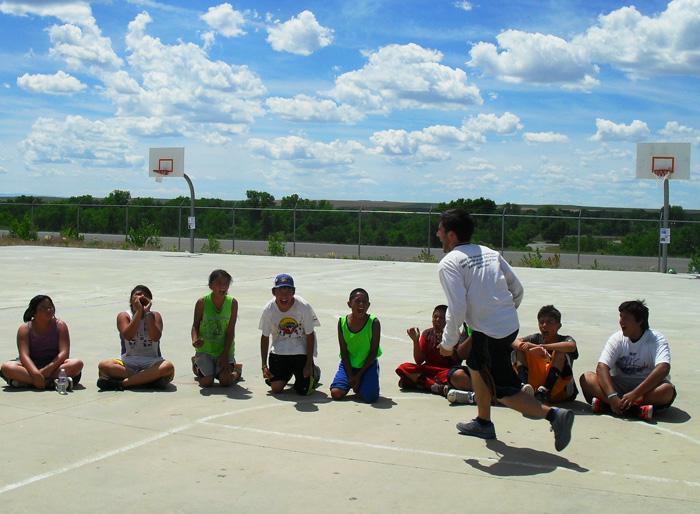Shifting the Cultural Tides

David Dean '13 takes to the court to encourage participants in Unity Hoops, Dean's youth empowerment program. Photo courtesy of Bighair Photography.
David Dean ’13 lets inspiration take hold of him and turns it into something tangible. While at Dickinson, he created Unity Hoops, the youth education arm of the Center Pole community organization on the Crow Indian reservation in Montana, and M.O.R.E. (Men Overcoming Restrictive Expectations), a student group that creates an environment supporting men in who they are instead of who society might tell them to be. Now that he has graduated, the former political science major and Baird Sustainability Fellow is still involved in both, and he’s eyeing the future—his own and his organizations’.
What does your current work entail, and what about it interests you most?
I am currently working on two projects that began during my time at Dickinson. I am the director of Unity Hoops, where, in our youth programs, we integrate basketball, a wildly popular sport on the reservation, with a social-justice-centered academic curriculum. We strive to create healing in the lives of Crow Indian youth from traumas of the past and present and to empower them to lead a movement toward a just future for their people.
Additionally, after hearing of the good work that has taken place at Dickinson, Wesleyan University and Haverford College recently began developing their own campus chapters of M.O.R.E. This news inspired us to create the M.O.R.E. Campus Network, a collaborative association of all current student groups, and a soon-to-be-released online resource database filled with our curriculum and philosophy to help even more chapters get started.
We'll soon be launching a new Unity Hoops program called Pathway to College, through which we’ll build relationships with a group of high-school students over multiple years and help them walk forward on a road to and through college—while also preparing them for a lifetime of investment in their community.
In each of these projects, I have had opportunities to facilitate an educational process that empowers young people to love and accept themselves exactly as they are and to become activists in their communities. It's in these things that I've found the most fulfillment and joy.
Can you speak to how Dickinson’s “useful education” might apply to what you’re up to now?
For those students who have developed the critical consciousness to see how varied forms of oppression create immense suffering in the lives of many and dehumanize us all, Dickinson offers a micro-ecosystem in which they can hone their abilities as activists and see tangible social change take place on campus. At Dickinson I gained experiential knowledge about shifting the cultural tides of a community toward deeper and more unconditional love, and I will carry that with me for the rest of my life.
What jumps out as a great memory from your time at Dickinson?
Dickinson's first men’s retreat, which we held in 2011, was a surprising and incredible experience for me. Imagine a circle of men sharing about their fears, their traumas, their values, their struggle to express emotion and their desire to live more compassionate, fulfilling lives. There were tears and everything. It was a special weekend that made it apparent how needed those types of spaces are.
How do you stay involved with Dickinson, and why do you think it’s important?
One way that I stay involved with Dickinson is in my own advocacy for the college to divest its endowment of fossil fuel stocks. The students of mine pictured above recently had their community ravaged by record-breaking floods and wildfires. There are Dickinson students whose countries of origin are becoming more and more submerged by rising sea levels. The college must do its part in shifting social and political power away from the companies whose business plan has been proven to shortly bring the devastating effects of climate change to each of us. No matter how seemingly inconvenient, we must find a way to divest.
You just built a time machine: Where and when do you go?
I would go however far back it was before the indigenous societies that I come from, in Europe and possibly elsewhere, were touched by Western empire-building forces. When my ancestors had some of their first languages and first cultures. I would love to interact with them, share with them, live in community with them and see what I could learn from them that could help lead us to greater freedom and sustainability in our world today.
If you could change one thing about your life, what would it be?
I would get everyone that I love from all around the world to live in one place.
Learn more
- Alumni in Action
- Baird Sustainability Fellowship
- Dean's recently published paper, "Healing Men and Restoring Community: Reflections on a Collegiate Project for Men's Liberation"
- Unity Hoops
- Latest News
Published September 8, 2014